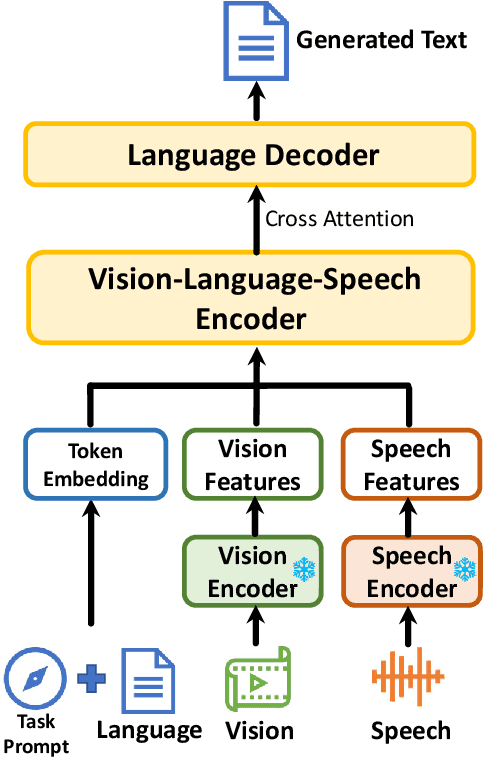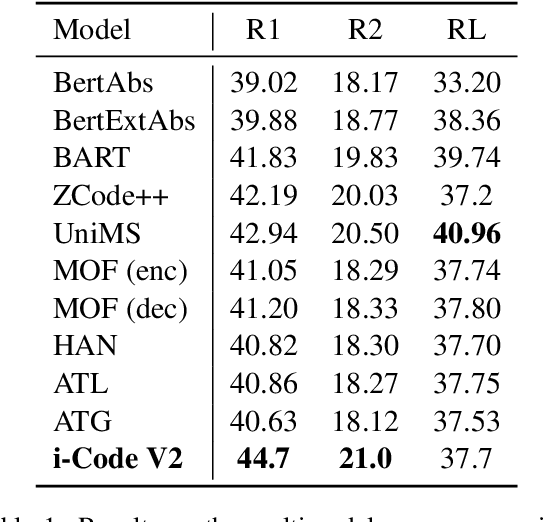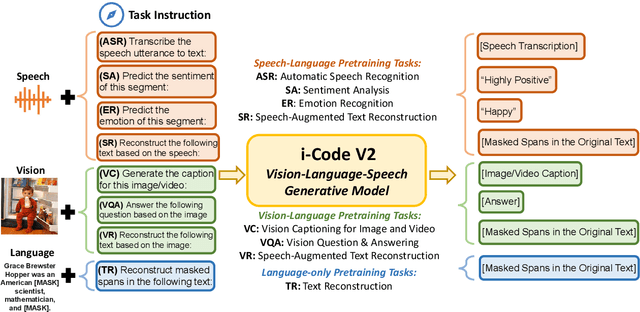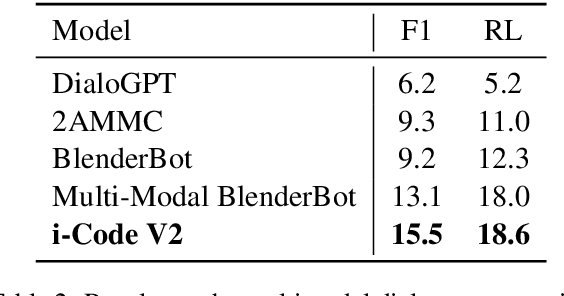Yichong Xu
Auto-Instruct: Automatic Instruction Generation and Ranking for Black-Box Language Models
Oct 19, 2023Abstract:Large language models (LLMs) can perform a wide range of tasks by following natural language instructions, without the necessity of task-specific fine-tuning. Unfortunately, the performance of LLMs is greatly influenced by the quality of these instructions, and manually writing effective instructions for each task is a laborious and subjective process. In this paper, we introduce Auto-Instruct, a novel method to automatically improve the quality of instructions provided to LLMs. Our method leverages the inherent generative ability of LLMs to produce diverse candidate instructions for a given task, and then ranks them using a scoring model trained on a variety of 575 existing NLP tasks. In experiments on 118 out-of-domain tasks, Auto-Instruct surpasses both human-written instructions and existing baselines of LLM-generated instructions. Furthermore, our method exhibits notable generalizability even with other LLMs that are not incorporated into its training process.
Sparse Modular Activation for Efficient Sequence Modeling
Jul 11, 2023



Abstract:Linear State Space Models (SSMs) have demonstrated strong performance in a variety of sequence modeling tasks due to their efficient encoding of the recurrent structure. However, in more comprehensive tasks like language modeling and machine translation, self-attention-based models still outperform SSMs. Hybrid models employing both SSM and self-attention generally show promising performance, but current approaches apply attention modules statically and uniformly to all elements in the input sequences, leading to sub-optimal quality-efficiency trade-offs. In this work, we introduce Sparse Modular Activation (SMA), a general mechanism enabling neural networks to sparsely and dynamically activate sub-modules for sequence elements in a differentiable manner. Through allowing each element to skip non-activated sub-modules, SMA reduces computation and memory consumption at both training and inference stages of sequence modeling. As a specific instantiation of SMA, we design a novel neural architecture, SeqBoat, which employs SMA to sparsely activate a Gated Attention Unit (GAU) based on the state representations learned from an SSM. By constraining the GAU to only conduct local attention on the activated inputs, SeqBoat can achieve linear inference complexity with theoretically infinite attention span, and provide substantially better quality-efficiency trade-off than the chunking-based models. With experiments on a wide range of tasks, including language modeling, speech classification and long-range arena, SeqBoat brings new state-of-the-art results among hybrid models with linear complexity and reveals the amount of attention needed for each task through the learned sparse activation patterns.
In-Context Demonstration Selection with Cross Entropy Difference
May 24, 2023Abstract:Large language models (LLMs) can use in-context demonstrations to improve performance on zero-shot tasks. However, selecting the best in-context examples is challenging because model performance can vary widely depending on the selected examples. We present a cross-entropy difference (CED) method for selecting in-context demonstrations. Our method is based on the observation that the effectiveness of in-context demonstrations negatively correlates with the perplexity of the test example by a language model that was finetuned on that demonstration. We utilize parameter efficient finetuning to train small models on training data that are used for computing the cross-entropy difference between a test example and every candidate in-context demonstration. This metric is used to rank and select in-context demonstrations independently for each test input. We evaluate our method on a mix-domain dataset that combines 8 benchmarks, representing 4 text generation tasks, showing that CED for in-context demonstration selection can improve performance for a variety of LLMs.
i-Code Studio: A Configurable and Composable Framework for Integrative AI
May 23, 2023



Abstract:Artificial General Intelligence (AGI) requires comprehensive understanding and generation capabilities for a variety of tasks spanning different modalities and functionalities. Integrative AI is one important direction to approach AGI, through combining multiple models to tackle complex multimodal tasks. However, there is a lack of a flexible and composable platform to facilitate efficient and effective model composition and coordination. In this paper, we propose the i-Code Studio, a configurable and composable framework for Integrative AI. The i-Code Studio orchestrates multiple pre-trained models in a finetuning-free fashion to conduct complex multimodal tasks. Instead of simple model composition, the i-Code Studio provides an integrative, flexible, and composable setting for developers to quickly and easily compose cutting-edge services and technologies tailored to their specific requirements. The i-Code Studio achieves impressive results on a variety of zero-shot multimodal tasks, such as video-to-text retrieval, speech-to-speech translation, and visual question answering. We also demonstrate how to quickly build a multimodal agent based on the i-Code Studio that can communicate and personalize for users.
LMGQS: A Large-scale Dataset for Query-focused Summarization
May 22, 2023



Abstract:Query-focused summarization (QFS) aims to extract or generate a summary of an input document that directly answers or is relevant to a given query. The lack of large-scale datasets in the form of documents, queries, and summaries has hindered model development in this area. In contrast, multiple large-scale high-quality datasets for generic summarization exist. We hypothesize that there is a hidden query for each summary sentence in a generic summarization annotation, and we utilize a large-scale pretrained language model to recover it. In this way, we convert four generic summarization benchmarks into a new QFS benchmark dataset, LMGQS, which consists of over 1 million document-query-summary samples. We thoroughly investigate the properties of our proposed dataset and establish baselines with state-of-the-art summarization models. By fine-tuning a language model on LMGQS, we achieve state-of-the-art zero-shot and supervised performance on multiple existing QFS benchmarks, demonstrating the high quality and diversity of LMGQS.
InheritSumm: A General, Versatile and Compact Summarizer by Distilling from GPT
May 22, 2023Abstract:While large models such as GPT-3 demonstrate exceptional performance in zeroshot and fewshot summarization tasks, their extensive serving and fine-tuning costs hinder their utilization in various applications. Conversely, previous studies have found that although automatic metrics tend to favor smaller fine-tuned models, the quality of the summaries they generate is inferior to that of larger models like GPT-3 when assessed by human evaluators. To address this issue, we propose InheritSumm, a versatile and compact summarization model derived from GPT-3.5 through distillation. InheritSumm not only exhibits comparable zeroshot and fewshot summarization capabilities to GPT-3.5 but is also sufficiently compact for fine-tuning purposes. Experimental results demonstrate that InheritSumm achieves similar or superior performance to GPT-3.5 in zeroshot and fewshot settings. Furthermore, it outperforms the previously established best small models in both prefix-tuning and full-data fine-tuning scenarios.
i-Code V2: An Autoregressive Generation Framework over Vision, Language, and Speech Data
May 21, 2023



Abstract:The convergence of text, visual, and audio data is a key step towards human-like artificial intelligence, however the current Vision-Language-Speech landscape is dominated by encoder-only models which lack generative abilities. We propose closing this gap with i-Code V2, the first model capable of generating natural language from any combination of Vision, Language, and Speech data. i-Code V2 is an integrative system that leverages state-of-the-art single-modality encoders, combining their outputs with a new modality-fusing encoder in order to flexibly project combinations of modalities into a shared representational space. Next, language tokens are generated from these representations via an autoregressive decoder. The whole framework is pretrained end-to-end on a large collection of dual- and single-modality datasets using a novel text completion objective that can be generalized across arbitrary combinations of modalities. i-Code V2 matches or outperforms state-of-the-art single- and dual-modality baselines on 7 multimodal tasks, demonstrating the power of generative multimodal pretraining across a diversity of tasks and signals.
Small Models are Valuable Plug-ins for Large Language Models
May 15, 2023Abstract:Large language models (LLMs) such as GPT-3 and GPT-4 are powerful but their weights are often publicly unavailable and their immense sizes make the models difficult to be tuned with common hardware. As a result, effectively tuning these models with large-scale supervised data can be challenging. As an alternative, In-Context Learning (ICL) can only use a small number of supervised examples due to context length limits. In this paper, we propose Super In-Context Learning (SuperICL) which allows black-box LLMs to work with locally fine-tuned smaller models, resulting in superior performance on supervised tasks. Our experiments demonstrate that SuperICL can improve performance beyond state-of-the-art fine-tuned models while addressing the instability problem of in-context learning. Furthermore, SuperICL can enhance the capabilities of smaller models, such as multilinguality and interpretability.
G-Eval: NLG Evaluation using GPT-4 with Better Human Alignment
Apr 06, 2023Abstract:The quality of texts generated by natural language generation (NLG) systems is hard to measure automatically. Conventional reference-based metrics, such as BLEU and ROUGE, have been shown to have relatively low correlation with human judgments, especially for tasks that require creativity and diversity. Recent studies suggest using large language models (LLMs) as reference-free metrics for NLG evaluation, which have the benefit of being applicable to new tasks that lack human references. However, these LLM-based evaluators still have lower human correspondence than medium-size neural evaluators. In this work, we present G-Eval, a framework of using large language models with chain-of-thoughts (CoT) and a form-filling paradigm, to assess the quality of NLG outputs. We experiment with two generation tasks, text summarization and dialogue generation. We show that G-Eval with GPT-4 as the backbone model achieves a Spearman correlation of 0.514 with human on summarization task, outperforming all previous methods by a large margin. We also propose preliminary analysis on the behavior of LLM-based evaluators, and highlight the potential issue of LLM-based evaluators having a bias towards the LLM-generated texts.
APOLLO: A Simple Approach for Adaptive Pretraining of Language Models for Logical Reasoning
Dec 19, 2022



Abstract:Logical reasoning of text is an important ability that requires understanding the information present in the text, their interconnections, and then reasoning through them to infer new conclusions. Prior works on improving the logical reasoning ability of language models require complex processing of training data (e.g., aligning symbolic knowledge to text), yielding task-specific data augmentation solutions that restrict the learning of general logical reasoning skills. In this work, we propose APOLLO, an adaptively pretrained language model that has improved logical reasoning abilities. We select a subset of Wikipedia, based on a set of logical inference keywords, for continued pretraining of a language model. We use two self-supervised loss functions: a modified masked language modeling loss where only specific parts-of-speech words, that would likely require more reasoning than basic language understanding, are masked, and a sentence-level classification loss that teaches the model to distinguish between entailment and contradiction types of sentences. The proposed training paradigm is both simple and independent of task formats. We demonstrate the effectiveness of APOLLO by comparing it with prior baselines on two logical reasoning datasets. APOLLO performs comparably on ReClor and outperforms baselines on LogiQA.
 Add to Chrome
Add to Chrome Add to Firefox
Add to Firefox Add to Edge
Add to Edge